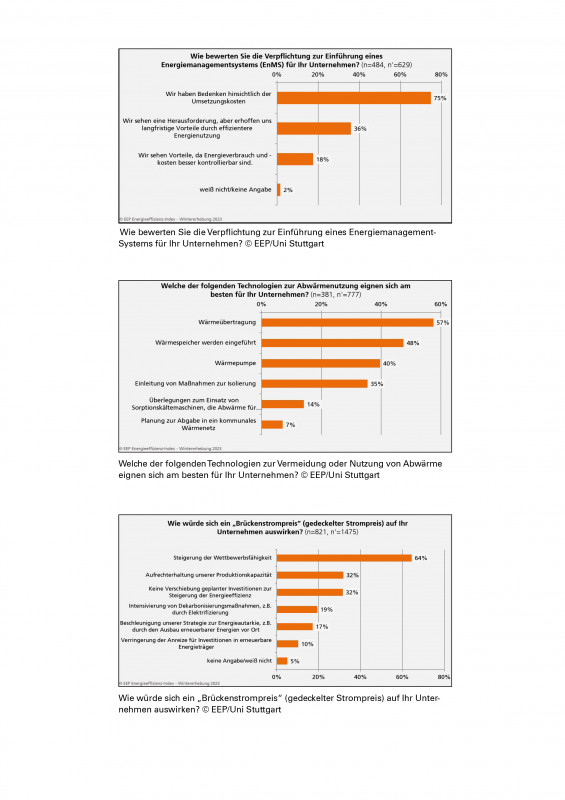
The EEP Institute for Energy Efficiency in Production at the University of Stuttgart has been surveying current and planned energy efficiency activities in German industry every six months since 2013. The EEI is compiled in collaboration with the German Energy Agency (dena), the Federation of German Industries (BDI), Fraunhofer IPA and TÜV Rheinland as well as other partners. Over 820 participants commented on the three sub-indices during the current survey period. The current focus was on the new Energy Efficiency Act and the bridge electricity price in Germany.
The relevance of energy efficiency is growing steadily and the importance index has surpassed its previous high. At the same time, the investment index rose by 0.75 points to an index value of 1.61. In the last survey, this sub-index was at a historic low of 0.86. Due to the current uncertain framework conditions for investments, companies expect shorter amortisation periods for energy efficiency measures. Around 70% of companies assume that such measures should amortise within five years.

Concrete action is needed now
The new Energy Efficiency Act (EnEfG) obliges companies with an average energy consumption of more than 7.5 gigawatt hours (GWh) in the last three years to introduce an energy or environmental management system. Around 27% of the companies participating in the current index survey are therefore required to do so. Together with the companies that have an annual average energy consumption of over 2.5 GWh in the same period, they must draw up and publish specific implementation plans for final energy saving measures identified as cost-effective within three years. The survey shows that this applies to around half of the companies surveyed.
Around half of the participating companies also state that they have sufficient internal expertise to implement an energy management system (EnMS). Around a third are using external support or building up their own capacities for implementation. Three quarters of those surveyed feared that the implementation costs would be too high, while almost a third of the companies stated that they saw benefits from the introduction of energy management systems in the increased transparency with regard to energy consumption, despite the associated costs.
The law also requires companies to avoid or utilise waste heat. Around 36% of the companies surveyed stated that they are already applying such measures or are in the process of implementing them. In addition, 11% of companies stated that they had identified the potential for utilising waste heat but had not yet tapped into it. Heat transfer, heat storage or heat pumps are frequently cited as suitable technologies, with own utilisation often taking centre stage.
Capped industrial electricity prices as an incentive for sustainable transformation projects
The majority of companies recognise a capped electricity price as an opportunity to increase their competitiveness. Around a third estimate that this would enable them to maintain their production capacities. It should be emphasised in particular that many companies see a capped industrial electricity price as an additional incentive for sustainable transformation projects. For example, planned investments to increase energy efficiency would not have to be postponed, decarbonisation measures could be intensified and strategies for energy self-sufficiency could be accelerated.
"Over the course of the last surveys, we have seen an increasingly differentiated approach to the topic of energy efficiency among companies. This is a very positive development. However, the regulatory and bureaucratic framework must not be overstretched. In my opinion, the obligation to introduce energy systems has reached its limits," says Professor Alexander Sauer, Director of the Institute for Energy Efficiency in Production (EEP).

